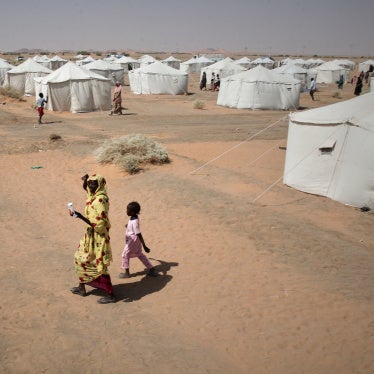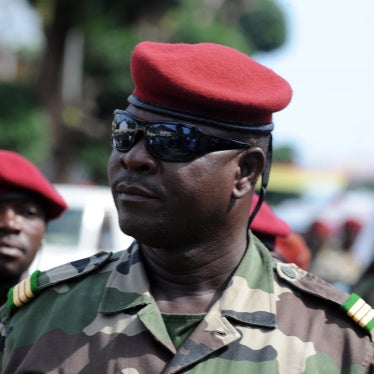Dear Justice Ministers and Attorneys General,
On the occasion of the meeting of Government Experts and Ministers of Justice and Attorneys General on Legal Matters to be held in Addis Ababa, Ethiopia on May 7-15, 2012, we, the undersigned African civil society organizations and international organizations with a presence in Africa, write to share our concerns regarding the proposed expansion of the jurisdiction of the African Court of Justice and Human Rights (African Court) to the prosecution of individuals for crimes including but not limited to genocide, war crimes, and crimes against humanity. We understand that discussions on a draft protocol to amend the protocol on the African Court statute to include criminal jurisdiction have now advanced and that the upcoming meeting may consider endorsement of the draft protocol.
Many of the undersigned organizations previously wrote to African states parties of the International Criminal Court (ICC) regarding this proposed expansion of jurisdiction. The addition of jurisdiction to try individuals before a regional court like the African Court would be unprecedented. It raises a number of questions meriting careful study and attention. In light of the shared goal of advancing the cause of justice for crimes under international law, we respectfully ask you to give careful attention to the concerns raised below and to defer endorsement of the draft protocol to permit further consideration and consultation.
Impact on the human rights mandate of the African Court and system
The expansion of the African Court’s jurisdiction risks undermining progress in the development of Africa’s human rights system. The merger between the existing African Court on Human and Peoples’ Rights and the African Court of Justice could already dilute the work of the former. Adding a third mandate to the African Court will further drain away resources needed to shore up the African Court’s human rights mandate. By enforcing important rights to justice, truth, and reparation, regional human rights courts can make essential contributions to the fight against impunity as a part of a broader human rights protection.
In addition, the prospect of criminal jurisdiction may be a disincentive for some states to join the merged African Court. But once the merged Court comes into existence, the African Court on Human and Peoples’ Rights will be discontinued. If states have not joined the African Court, they may remain not only outside the African Court’s criminal jurisdiction but also its human rights mandate.
The potential impact on the African human rights system should be the subject of further consultation with officials of the existing African Commission and Court on Human and Peoples’ Rights and civil society.
Diverting attention and resources from national obligations in the fight against impunity
African Union (AU) members have the primary obligation to investigate and, if there is sufficient evidence, prosecute persons suspected of crimes under international law before their national courts. The ICC already promotes complementarity at the national level. Expanding the African Court’s jurisdiction and diluting the work of the current African Court on Human and Peoples’ Rights may not only undermine human rights protection but also divert resources and attention from strengthening the ability and willingness of national authorities to prosecute international crimes.
Impact on the broader fight against impunity
It will take time for amendments expanding the African Court’s jurisdiction to include criminal cases to take effect. Since 2008 only three states have joined the African Court merger protocol. Non-ICC states parties may use the prospect of future regional criminal jurisdiction to justify not joining the ICC, but without any guarantee that they will ever join the African Court’s jurisdiction or cooperate in cases before the African Court. The expansion of the African Court’s jurisdiction could, therefore, actually maintain current gaps in accountability and undermine efforts to widen the reach of international justice.
Challenges of establishing a regional criminal court
The task of establishing such a court is complex, time consuming, and expensive. Individual criminal prosecutions in accordance with international standards have entirely different requirements than the adjudication of human rights violations committed by states or during intra-state disputes. These include the obtaining and retention of evidence; protection and support for victims and witnesses; outreach to victims and affected communities; pre-trial detention; protection of defense rights; investigations and prosecutions; trials and imprisonment; and state cooperation. It has taken the ICC nearly ten years to put systems in place to perform these functions and to complete its first trial. There is a danger that the complex process of establishing a fully functional regional criminal court could delay its delivery of justice. An international human rights court, being a court of final instance and reviewing a state's compliance with human rights laws, requires entirely different expertise, staff, and functioning.
Implementing an expanded mandate will also be costly at a time when the operation of other regional mechanisms remains limited due to resource constraints. The cost of a single trial of an international crime has been estimated at nearly US$20 million. This represents almost double the combined approved 2009 budgets of the African Commission and Court on Human and Peoples’ Rights.[1] Meeting these costs has not been the subject of AU members’ discussions and cost estimations and proposals for securing the required funding have not been drafted. Insufficient funding has the potential to prevent the proper dispensation of justice and could raise questions about the integrity and credibility of the proceedings before the court.
In addition, AU members will need to consider how the African Court will secure cooperation among and beyond its parties. The experience of international criminal tribunals demonstrates that broad support is essential to arrests and assistance in investigations; discussions of a regional criminal tribunal should reflect on the experiences and shortcomings of other international criminal tribunals.
No other regional organization has vested its international courts, which hear cases against states, with individual criminal jurisdiction.
Clarifying the relationship between an expanded African Court and the ICC and the impact on obligations of African ICC states parties
African ICC states parties provide essential backing—including funding—to the ICC, and a number of African individuals have been appointed to senior offices at the ICC. The continued engagement of African states parties is vital to the ICC’s success. If the African Court’s jurisdiction is expanded, African ICC states parties may face duplicative or competing obligations between the African Court and the ICC, including in resource and cooperation requests. The draft protocol apparently makes no reference to the Rome Statute even though 33 African states are party to the ICC. In the absence of guidance African ICC states parties would be placed in a situation which may frustrate efforts at accountability and their relationship with the ICC and other institutions. It is particularly important to consider how the ICC’s complementarity regime would apply to regional criminal prosecutions and whether the ICC would remain a court of last resort if prosecutions are blocked at the regional level.
Need for wider consultation and further study
Rushed discussions on the expansion of the African Court’s jurisdiction and a lack of transparency have not permitted adequate consultation with civil society, legal experts in AU member countries, or officials of the African Court and Commission on Human and Peoples’ Rights. In particular, drafts of the protocol have not been made public for consultation and distributed to civil society. Questions around jurisdiction, the definition of crimes, immunities, institutional design and the practicality of administration and enforcement of an expanded jurisdiction, among others, require careful examination. In this regard, and in the spirit of openness, transparency, and good regional governance, a genuine process of consultation should be facilitated. In light of their key role in the establishment and implementation of African regional human rights mechanisms and the ICC, civil society organizations have critical expertise to offer, as do other relevant stakeholders.
We hope this information will be of use to your discussions at the upcoming meeting, and that in light of the concerns raised in this letter, you will consider deferring endorsement of the draft protocol in order to permit further consultation and study.
Sincerely,
[1] Coalition for an Effective African Court on Human and Peoples’ Rights, Darfur Consortium, East African Law Society, International Criminal Law Centre, Open University of Tanzania, Open Society Justice Initiative, Pan-African Lawyers Union, Southern Africa Litigation Centre, West African Bar Association, “Implications of the African Court of Human and Peoples’ Rights Being Empowered to Try International Crimes such as Genocide, Crimes against Humanity, and War Crimes,” December 17, 2009, http://www.soros.org/initiatives/justice/news/africa_20091217/africa_200... (accessed April 27, 2012).








